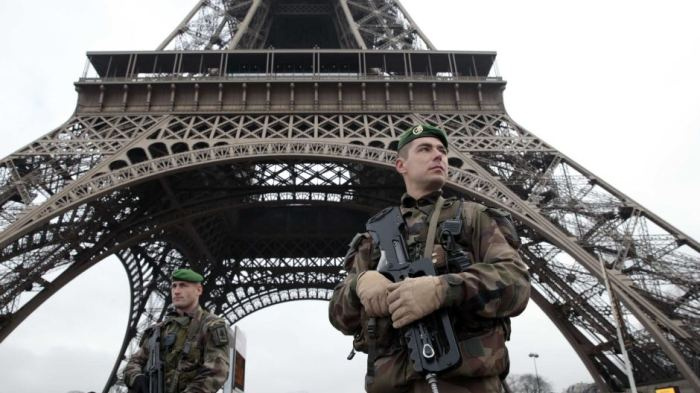Challenging the Enemy at Home

By: Hossein Malaek
Was ISIS behind the Paris attacks? The group has officially claimed responsibility for the terrorist attacks that took place on November 13th. Thus, considering the silence of other potential suspect groups, we can safely make the following deductions:
1. ISIS is powerful enough to carry out three terrorist operations, i.e. Paris attacks, Beirut suicide bombing and Russian airplane crash, against the 'infidels' and 'enemies of Islam' in a short time span.
2. Even if another group has launched any of these operations, it has preferred to sit back and assign the responsibility to ISIS. That is, ISIS has managed to co-opt other terrorist groups active in Syria and Lebanon to join its campaign. The most prominent of these groups is Al-Qaeda.
What goals did ISIS/Da'esh follow from these operations? And is the Islamic State in the offensive or defensive position?
Since Russia stepped up its presence in Syria to root out Da'esh, the terrorist group has organized three operations: blowing up a Russian airline flying from Sherm el-Sheikh in Egypt to St. Petersburg, carrying out two suicide attacks in southern suburb of Dahiyeh in Beirut, and running a chain of terrorist attacks in Paris. Presuming that all three operations were masterminded through a single headquarter, two key targets were probably intended: Russia, whose presence in Syria has significantly debilitated all opposition groups, and Hezbollah and its social base, as one of the key military arms support the Syrian government.
During the past month, a series of political initiatives, including Vienna I and Vienna II conferences were held to find a solution for the Syrian crisis. From a strategic viewpoint, the worst option for an organization involved in both political and military phases would be to launch a terrorist operation one day before such a conference. Da'esh nonetheless launched its chain of terrorist attacks in Paris exactly before the new round of conference in Vienna, and united against itself all parties taking part in the conference. Even Turkey, Saudi Arabia and Qatar could not have saved ISIS.
So it is presumable that ISIS did not care to influence the course of negotiations in Vienna. Let's not forgot that last year, after Da'esh captured the city of Mosul and Abubakr al-Baghdadi and his group appeared on the map, against conventional political calculus, they launched an attack on Erbil, capital of Iraq's Kurdistan region, and later beheaded a number of their American captives to enter a direct heads-on with Washington. Those ventures turned ISIS more international and brought it fresh recruits from other countries and consequently bolstered its support base. Despite US' claims that ISIS is becoming weaker and its key figures have been eliminated, the group has becoming increasingly powerful on the grounds and has annexed further regions to its territory.
Thus, one can speculate that Paris attacks were more aimed to flex muscle against other opposition groups in Syria, attract further enthusiasts, and further polarize the battle into a Manichean form of good against evil. The three recent operations were aimed at three major enemies, the Russian infidel, the Shias and the Western infidel. Paris was a favorite choice for ISIS, since the group had more leeway in France compared with the US or any other Western country.
Could the Paris attacks instigate changes in the situation in Syria and lead to a political solution for the country?
At the heat of the moment, every politician is speaking of uniting against ISIS. John Kerry who visited Paris after his attendance of G20 summit in Turkey stated that Ankara has agreed to close ground borders with Syria to block ISIS recruits' passage into the country. This is a significant development, knowing that Ankara is ISIS' key supporter in Syria and it is through Turkey's borders that Assad opposition receives the main bulk of its aid.
Saudi Arabia and UAE also seem to have come to the conclusion that the game is over for Da'esh. Moscow and Washington have become closer in their attitude, showing more flexibility towards the situation in Syria. Clearly, if Syria turned into another battleground for a proxy war between world powers it would be a nightmare for countries such as Iran. Europeans have also followed a pragmatist attitude regarding Russia's role in Syria and wish Moscow's intervention can solve the problem. For Moscow, this can be a face-saving return to the global stage after its annexation of Crimea.
On the other side, it seems that militant groups in Syria and Iraq including ISIS whose goal was to preserve their territories have come to the conclusion that the global situation is not conducive to that end. Thus, the only option for them is to form alliances with each other and launch their operations outside Syria and Iraq to challenging the 'enemy' within its own territory. ISIS has the highest number of international recruits in its structure, and its supporters are spread in various countries. Thus, a global chain of terrorist attacks in short-term and middle-term is a possibility which should not be left unnoticed.
* This piece was originally published in IRD Persian. Hossein Malaek is Iran's former ambassador to China.

